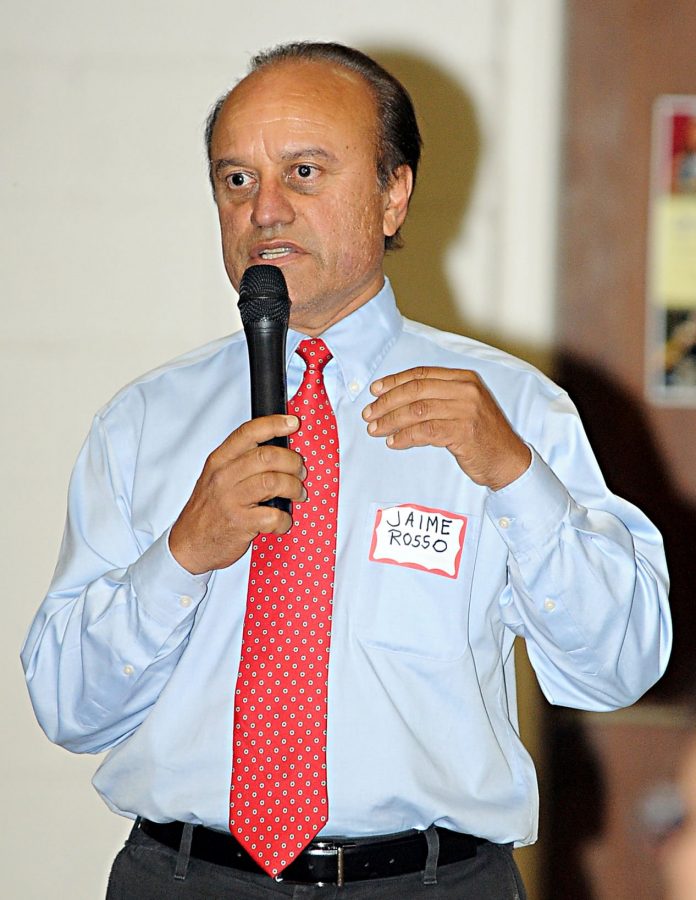
The Gilroy-Morgan Hill Patriots hosted a forum Sept. 25 for candidates for the Gilroy City Council and Gilroy Unified School District. Incumbent council member Dion Bracco joined current planning commissioner and former council member Paul Kloecker at the event, held at the San Martin Lions Club, as they answered questions submitted by attendees. Gilroy Unified School Board incumbents Tom Bundros and Jaime Rosso were also in attendance along with challenger Heather Brown.
According to event organizer Georgine Scott-Codiga, all five candidates for the council and six for the GUSD board were invited to participate. Incumbent council member Peter Leroe-Munoz and candidates Tim Fischer and Roland Velasco were not in attendance, while GUSD incumbents Patricia Mitgaard and Dom Payne as well as candidate Linda Piceno were absent from the forum
Questions for the council candidates touched on topics ranging from their stance on the upcoming “Quality of Life” sales tax measure to what the city’s role should be in encouraging downtown to flourish.
Bracco—born and raised in Gilroy—said he’s seeking his third consecutive term on the council because the city has some “unfinished business,” pointing to homelessness and the regional fight against gangs.
“I’m the only Gilroy council member who owns a business,” Bracco said, of owning Bracco’s Towing. “Being a business owner, I’m fiscally conservative. I know how important it is to balance your budget.”
Kloecker, who has a background in engineering and served with the U.S. Navy, served three consecutive terms on the council beginning in 1983. He said he threw his hat in the ring because he believes the council is headed in the right direction.
“I really like to do things that involve planning and capital construction—and anything to do with financial management,” Kloecker said. “I think the present council has done a great thing in developing a strategic plan which shows different goals and items to do over the next five years. I’d like to further that and see that gets along.”
When the discussion shifted to the sales tax measure, both Bracco and Kloecker were in agreement—if it’s what the voters want, it’s the right thing to do.
Prior to the council’s vote Aug. 4 to place the half-cent general-purpose sales tax measure on the November ballot, Bracco was the only council member to vote against approving a contract between an Oakland consulting firm and the city to conduct outreach on the feasibility of the measure.
“The reason I changed by vote is, one, that it was 6-1,” Bracco added. I don’t believe that digging in my heels and fighting it—and going against my fellow council members—would do me any good. It wouldn’t do the city any good. I do believe that if it passes, we need people on the city council who will hold staff accountable and make sure every dime is spent on the good of the whole community-not for any one group in the city.”
Echoing similar sentiments, Kloecker agreed with Bracco that oversight is a key sticking point.
“I think there are a lot of good things on that list (of projects that would be funded through Measure F),” Kloecker said. “Like Dion, I want to see that every dime is spent on what it was intended for. Follow the will of the voters.”
All five council candidates are expected to participate in a public forum Oct. 4 co-sponsored by the League of Women Voters and the American Association of University Women. The event will take place between 1 and 3 p.m. in the community room of the Gilroy Public Library, located at 350 W. Sixth St.
Candidates for the GUSD board were asked to share their views on Common Core academic standards, making firing underperforming teachers easier and why the GUSD schools appear to be underperforming despite receiving more funding.
Russo, who is seeking his fourth term, said he strongly supports Common Core because it helps students with “problem solving real world problems.” Bass, a teacher with the Santa Clara County Office of Education, disagreed, saying students need alternatives when it comes to their curriculum.
“We are one of the only nations with standards that actually say that we’re going to educate every single one of our citizens exactly the same,” she said, noting she’d like to see the district offer more career-based learning like those students will spend thousands to acquire at schools such as ITT Tech.
Bundros supported the idea of career-based classes, but when it comes to Common Core, he said GUSD didn’t have a choice in the matter.
“The state adopted it; I’m not happy with a lot of it,” Bundros, who has served on the board for 12 years said. “Parts of it make sense, parts of it don’t. The key is how we implement it and that’s going to require the cooperation of the administration, the teachers and the school board to go right.”
All three agreed that firing underperforming teachers should be easier, but only after it’s clear the teacher has received all the tools needed to succeed. Bass said new teachers too often can’t flourish due to lack of on the job training. Bundros added professional development is key to all teacher’s success, but that underperforming teachers should be removed promptly before they cause too much damage.
“There’s a percentage of any professional in any area that really should be doing something else,” he said. “The criminal part about it is if you have a poor performing teacher, there’s a student in that classroom for nine months and they’re going to fall behind. If they fall behind two years in a row, they’re in serious, serious trouble.”
The candidates had varying responses for why GUSD schools seem to underperform while receiving more funding. Bass admitted to having little experience with this issue, but stated the problem could be the ever-changing curriculums that not only cost more money, but cause more confusion to students and teachers. Bundros said “there’s no easy answer,” but that GUSD has been studying other high performing districts with similar demographics in hopes of mimicking their success.
Russo, on the other hand, took a firm stance that GUSD schools are far from underperforming and challenged attendees to prove otherwise.
“I challenge anybody here who thinks that we’ve got some sort of substandard education in our schools to visit a Gilroy classroom,” Rosso said. “See what we have coming out of our schools. See the level of instruction and the high quality of instruction. Since 2009, we’re now offering twice as many AP classes as we did in 2009 with 28 AP classes in each of our high schools and GECA is the highest performing charter school in the state out of 25 (schools).”













